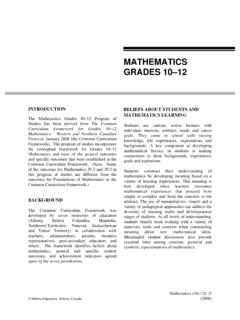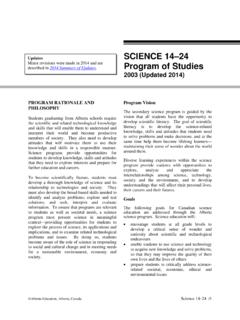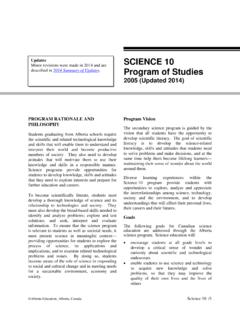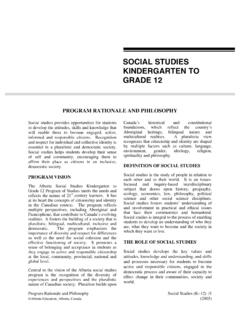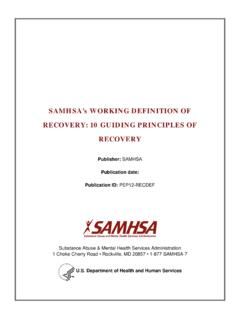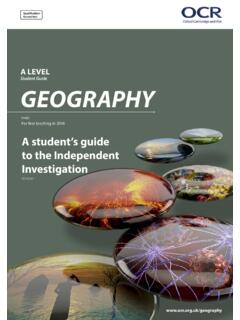Transcription of KINDERGARTEN PROGRAM STATEMENT - Alberta
1 KINDERGARTEN PROGRAM STATEMENT PROGRAM OVERVIEW RATIONALE Early childhood is a significant period in human development. independence , initiative, decision making, creativity, the ability to learn, the ability to relate to others and feelings of self-worth all have their beginnings in early childhood. What young children learn at this stage will have a major impact on successful learning experiences in school, on personal development and on future participation in society. Early Childhood Services (ECS) refers to a continuum of programming that is developmentally appropriate and meets the diverse needs of young children and their families.
2 In ECS programs, young children participate as active learners, build a shared set of experiences and develop knowledge, skills and attitudes that prepare them for subsequent learning. KINDERGARTEN refers specifically to the education PROGRAM for children in the year prior to Grade 1 and is part of the ECS continuum. The KINDERGARTEN learner expectations describe learnings that are appropriate for young children and are part of a learning pathway . Some children are already developing, or have developed, some of the learnings described in the KINDERGARTEN PROGRAM STATEMENT . Most children will achieve these learnings before they enter Grade 1.
3 Others will continue to develop them during the primary school years. The KINDERGARTEN PROGRAM not only helps prepare children for entry into Grade 1, but also provides a foundation for later success. PHILOSOPHY The Primary Programs Framework for Teaching and Learning, KINDERGARTEN to Grade 3: Guiding Principles, 2007, available on the Alberta Education Web site at , has been developed to provide the philosophical and theoretical foundation for teaching and learning in the primary grades. They reflect current understandings and contemporary education research on young children, families, communities and schools.
4 The purpose of the guiding principles is to help KINDERGARTEN to Grade 3 teachers reflect on the nature of young children and their learning to make informed instructional decisions and create learning environments that are responsive to children s diverse needs; capabilities; learning styles; dispositions and cultural, social and linguistic backgrounds. PROGRAM Overview KINDERGARTEN PROGRAM STATEMENT / 1 Alberta Education, Alberta , Canada (2008) In the guiding principles, children are viewed as diverse learners and active contributors within a variety of cultural and social contexts. Experiences within families and communities define the various pathways through which children learn in and outside of school.
5 In response to these differences, schools can build on children s diverse prior knowledge and experience. The guiding principles provide a framework for KINDERGARTEN programming. Principle 1 Childhoods differ depending on social and cultural circumstances. Childhood is one of life s stages. The developmental milestones of childhood are no longer thought to be universal and consistent across cultures. It is now recognized that explanations of child development, as well as expectations of developmental accomplishments, are socially constructed. This sociocultural-historical view emphasizes that there are multiple ways of being a child.
6 There is no universal childhood; rather, childhoods differ depending on the social and cultural circumstances in which children live. Culture and society have a significant impact on the ways in which children develop and learn that expands thinking about teaching and learning in the primary grades. In KINDERGARTEN : Young children arrive in KINDERGARTEN from diverse backgrounds and with a variety of experiences. Children develop through similar stages but at individual rates, and they need differing amounts of time and support to develop common understandings. KINDERGARTEN programming recognizes and supports each child s prior knowledge, skills, attitudes, learning pace, personal traits, interests and goals, and preferred learning styles.
7 Principle 2 Children s development is influenced but not determined by their early experiences. Children s early experiences influence social, physical, intellectual, creative, cultural and emotional development. Early childhood is the most active period of brain development although the brain continues to develop well beyond this time. Experience plays an important role in this development, with the nature of a child s early experience having a long-term impact on learning outcomes. 2 / KINDERGARTEN PROGRAM STATEMENT PROGRAM Overview (2008) Alberta Education, Alberta , Canada Although there is no direct cause-and-effect relationship between children s individual experiences and their later development, interaction between developmental areas either limits or supports the growth of contextual experience.
8 Young learners need rich and varied opportunities to explore their environment; use language; engage with peers and interact with responsive adults at home, school and in their communities. In KINDERGARTEN : A child whose developmental needs have been met is more likely to grow into a self-reliant, responsible, caring and contributing member of society. Principle 3 Children interact and learn in a variety of contexts. Learning also occurs in other environments than the home and school. Children gain significant experiences in a range of contexts that reflect and support varying social and cultural beliefs and values.
9 As members of different communities, children have diverse perspectives about events in their lives. Interaction within the context of these perspectives has a significant impact on the ways in which children form their identities as members of various cultural and social groups. A close partnership between schools, families and communities can strengthen the connections between children s learning and experiences, within these various contexts, and make them more meaningful. Children are more likely to be successful in negotiating transitions among the diverse environments in which they live if they are intellectually engaged and challenged, while feeling socially comfortable and safe.
10 In KINDERGARTEN : Before they enter the KINDERGARTEN PROGRAM , young children are learning in a variety of environments in their homes, in day care programs and in the community. This learning continues and both supports and is supported by KINDERGARTEN programming. The KINDERGARTEN PROGRAM supports and respects the dignity and worth of the family as parents play a central role in the lives of their children. Parents are their children s first and most important teachers and family influences are lifelong. The values and beliefs of the home are acknowledged, and the cultural diversity of families is recognized.

